Pyramid Rockets 3 Inch Flying Pyramid
Pyramid Rockets - 3 Inch Flying Pyramid
Contributed by Mal McClenaghan
| Construction Rating: | starstarstarstarstar |
| Flight Rating: | starstarstarstarstar |
| Overall Rating: | starstarstarstarstar |
| Manufacturer: | Pyramid Rockets |
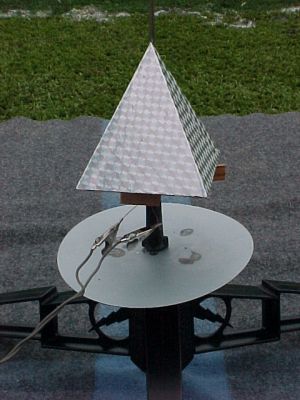
Brief:
I was looking for something different to fly with the kids when I saw this kit
from Pyramid Rocketry. It suited the task perfectly.
Construction:
The first thing you notice about this kit is the packaging. The kit and
instructions are in a heavy plastic zip-lock bag. It was good to see some
packaging I can actually use for something later, instead of having to throw it
in the rubbish.
Opening the bag there are instructions! Seven letter size pages of instructions with photographs showing the main steps of the build. Good instructions are important too, since construction of this little pyramid is quite different to your normal 3FNC rocket. Following the standard disclaimer, the real instructions start with a parts list where you can tick off the pieces as you find them in the bag. All pieces were present, including a dinky plastic medicine measure for mixing epoxy in. A list of recommended building items (e.g., 5 or 15 minute epoxy, super glue, wax paper) is also given.
The quality of all parts was very high and consisted of laser cut balsa and plywood and a pre-folded poster board cutout. The supplied balsa was extremely hard. This is the hardest balsa I have ever seen.
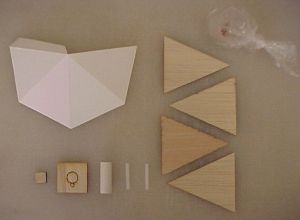 The
first step in construction was to glue up the poster board cutout into the
basic pyramid shape. No glue was specified, so I just used regular PVA (white
glue). Next comes preparing the balsa sides to fit inside the poster board
pyramid. The pre-cut balsa triangles have to be beveled at 45 degrees on the
edges so they will fit inside the poster board pyramid. I used popsicle sticks
with sandpaper glued to them, which are a nice little tool that you can use
like a file. The instructions are great and supportive here with comments like
"It is not very important that the triangles fit with perfect 90-degree
edges. As long as the triangles are not too big, proceed to the next
step." With the pyramid lined with balsa, the laser cut plywood components
are glued in to support the motor mount in the pyramid. The ply pieces need to
be sanded to a 60 degree bevel. Take a minute of your time to look at a 60
degree angle because it wasn't what I was expecting! Once the education on
angles is complete, it is time to add some nose weight to the pyramid. The
weight sits above a ply bulkhead which forms the top of the motor mount. The
instructions say to add epoxy coated BBs until this space is full and that only
a few (six)
The
first step in construction was to glue up the poster board cutout into the
basic pyramid shape. No glue was specified, so I just used regular PVA (white
glue). Next comes preparing the balsa sides to fit inside the poster board
pyramid. The pre-cut balsa triangles have to be beveled at 45 degrees on the
edges so they will fit inside the poster board pyramid. I used popsicle sticks
with sandpaper glued to them, which are a nice little tool that you can use
like a file. The instructions are great and supportive here with comments like
"It is not very important that the triangles fit with perfect 90-degree
edges. As long as the triangles are not too big, proceed to the next
step." With the pyramid lined with balsa, the laser cut plywood components
are glued in to support the motor mount in the pyramid. The ply pieces need to
be sanded to a 60 degree bevel. Take a minute of your time to look at a 60
degree angle because it wasn't what I was expecting! Once the education on
angles is complete, it is time to add some nose weight to the pyramid. The
weight sits above a ply bulkhead which forms the top of the motor mount. The
instructions say to add epoxy coated BBs until this space is full and that only
a few (six)
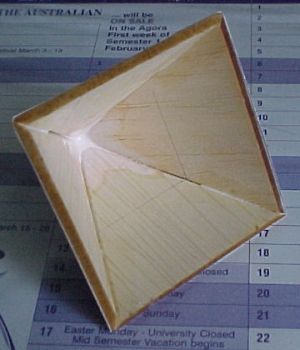 will fit. Try as I might, I couldn't get more than five BBs into that space!
Next is test fitting the motor mount and drilling the hole for the launch rod.
This is one of two potential problem areas for people who only skim through the
instructions. Test fitting and measuring is really critical at this stage.
Measure twice, drill once! Two short 28.6mm (1.125 inch) launch lugs are
supplied. Their combined length runs from the bottom of the motor mount through
the upper side of the pyramid. I threaded a 3mm drill bit through both lugs
when gluing them in place to make sure they stayed in alignment. A small amount
of glue seeped between the two joined ends. I simply cleaned this out with the
drill bit once the epoxy had cured. A significant amount of the top lug will
extend from the pyramid, however, don't panic if a launch rod won't slide
cleanly through your pyramid at this stage. Because the combined length of the
lugs is so great, a minimal angle deviation in alignment between the two lugs
will show up as binding. When the excess lug outside the pyramid is trimmed off
though, any small angular misalignment between the lugs doesn't cause the same
binding. My lugs showed significant binding before trimming even though I took
excruciating care in aligning them correctly.
will fit. Try as I might, I couldn't get more than five BBs into that space!
Next is test fitting the motor mount and drilling the hole for the launch rod.
This is one of two potential problem areas for people who only skim through the
instructions. Test fitting and measuring is really critical at this stage.
Measure twice, drill once! Two short 28.6mm (1.125 inch) launch lugs are
supplied. Their combined length runs from the bottom of the motor mount through
the upper side of the pyramid. I threaded a 3mm drill bit through both lugs
when gluing them in place to make sure they stayed in alignment. A small amount
of glue seeped between the two joined ends. I simply cleaned this out with the
drill bit once the epoxy had cured. A significant amount of the top lug will
extend from the pyramid, however, don't panic if a launch rod won't slide
cleanly through your pyramid at this stage. Because the combined length of the
lugs is so great, a minimal angle deviation in alignment between the two lugs
will show up as binding. When the excess lug outside the pyramid is trimmed off
though, any small angular misalignment between the lugs doesn't cause the same
binding. My lugs showed significant binding before trimming even though I took
excruciating care in aligning them correctly.
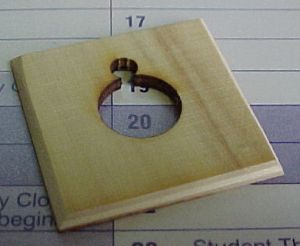

I would rate this as a 5 for construction. The instructions are very clear and well illustrated. On the Estes skill level scale, this kit would be a 2 and a bit, so let's call it a skill level 2.5.
Finishing:
I covered the pyramid with self adhesive "hologram" school book
covering film. This is a great finish for this kind of rocket, as a 1.1 meter
(3.6 foot) roll cost me $2.00! A quick coat of red enamel to the underside
finished the kit.
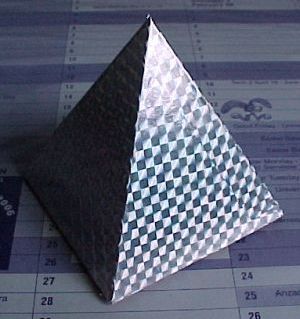
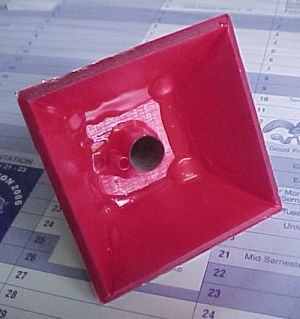
Construction Rating: 5 out of 5
Flight:
What could be easier? Insert a 13mm motor and launch! Absolutely no prep work
to be done--no chute, no streamer, and no wadding. Little pyramids are made for
drag recovery!
As a rule, I don't like to see rockets kick their motors, but it is hard to see how you can avoid it with this one. Ejected motors thankfully dropped close to the pyramid landing point.
Flights are straight up and down, with the pyramid landing close to the pad, even in gusty winds. The flight predicted in the instructions of 100 foot (30.5 meters) is spot on. We measured all our A10-3T flights with an Altitrack, and the flights averaged 30-35 meters. I wouldn't burn too many smaller motors smaller than the A10-3T in this one.
Recovery:
The reflective film looks great in strong sunlight.
Flight Rating: 5 out of 5
Summary:
This rocket is just plain fun. It was different to build and a real attention
getter at the local park. An excellent introduction to "rockets that don't
look like rockets". It is also a great demonstration of the effectiveness
of drag recovery.
Overall Rating: 5 out of 5
 |
 |